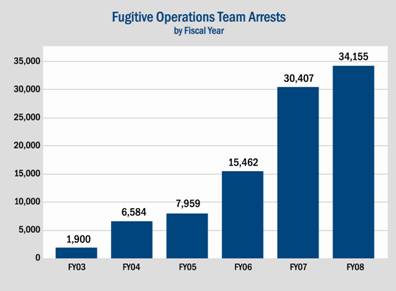
Quick Links
News
November 19, 2008
ICE Fugitive Operations Program
Background
U.S. Immigration and Customs Enforcement (ICE) established the first Fugitive Operations Teams in 2003 to dramatically expand the agency’s efforts to locate, arrest, and remove fugitives from the United States. An ICE fugitive is defined as an alien who has failed to leave the United States based upon a final order of removal, deportation, or exclusion; or who has failed to report to ICE after receiving notice to do so.
ICE’s Fugitive Operations Teams give top priority to cases involving aliens who pose a threat to national security and community safety, including members of transnational street gangs, child sex offenders, and aliens with prior convictions for violent crimes. The Fugitive Operations Team officers and agents use intelligence-based information and leads to locate and arrest aliens who have been ordered to leave the country by an immigration judge, but have failed to comply.
The National Fugitive Operations Program (NFOP) is responsible for reducing the fugitive alien population in the United States. ICE’s databases show the targeted enforcement strategy is paying off. The nation's fugitive alien population continues to decline. At the end of FY 2008, there were approximately 560,000 fugitive alien cases - a decrease of nearly 37,000 since the beginning of the fiscal year. This is a historic reversal of the previous growth trend in fugitive cases.
 Much of the credit for those results can be attributed to the rapid expansion of the program and the establishment of the Fugitive Operation Support Center (FOSC). When the initiative was launched in 2003, there were eight fugitive operations teams nationwide. Today ICE has approximately 100 Fugitive Operations Teams deployed nationwide to pursue these types of cases. In fiscal year 2008, those teams accounted for more than 34,000 arrests, more than double the total just two years ago.
Much of the credit for those results can be attributed to the rapid expansion of the program and the establishment of the Fugitive Operation Support Center (FOSC). When the initiative was launched in 2003, there were eight fugitive operations teams nationwide. Today ICE has approximately 100 Fugitive Operations Teams deployed nationwide to pursue these types of cases. In fiscal year 2008, those teams accounted for more than 34,000 arrests, more than double the total just two years ago.
ICE established the Fugitive Operations Support Center (FOSC) in June 2006 in South Burlington, Vermont. The FOSC is a key element in the strategy to address the burgeoning fugitive alien problem in the United States and is a tool the Compliance Enforcement Division uses to enhance the efficiency and effectiveness of the National Fugitive Operations Program (NFOP).
Through the use of technology, and partnerships with law enforcement agencies, the FOSC provides a specialized unit that focuses on analyzing the nature and characteristics of the U.S. fugitive alien backlog as recorded in the Deportable Alien Control System (DACS). This effort has also aided in reducing the reported number of existing fugitives by reconciling records to eliminate those who have left the country voluntarily, successfully adjusted their status, or were discovered to be incarcerated and therefore no longer fugitives. The FOSC has screened and analyzed data associated with more than 180 National ICE enforcement initiatives, resulting in thousands of arrests. ICE’s National Fugitive Operations Program is just one facet of the Department of Homeland Security's overarching strategy to secure America’s borders and reduce illegal migration.

